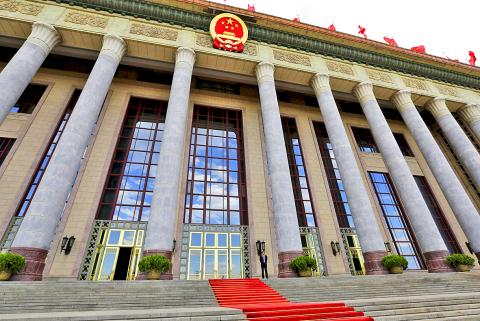China’s adoption yesterday of a new national security law that codified the inclusion of Taiwan was “very impolite behavior” toward Taiwan, Mainland Affairs Council Minister Andrew Hsia (夏立言) said, adding that the council would lodge a formal protest with Beijing.
The law adopted by the Standing Committee of the Chinese National People’s Congress (NPC) covers everything from territorial sovereignty and security of territorial seas and airspace to measures to tighten cybersecurity.
The Standing Committee passed the law by a vote of 154 to zero, with one abstention.

Photo: Reuters
It stipulates that: “Safeguarding China’s sovereignty and territorial integrity is the common obligation of all Chinese people, including people in Hong Kong, Macau and Taiwan.”
No unilateral action or lawmaking by the Chinese government could change the cross-strait reality, Hsia said, adding that the passage of the law was “very impolite behavior toward us.”
China should squarely face the fact that the two sides of the Taiwan Strait are governed by separate governments, he said.
Democratic Progressive Party spokesperson Cheng Yun-peng (鄭運鵬) criticized Beijing for disrespecting Taiwanese and called on the government to respond firmly to China’s move.
“The future of Taiwan should be decided by all 23 million people of Taiwan, and it is the mainstream opinion in Taiwan that we should insist on values of democracy and freedom, maintenance of the ‘status quo’ and constitutionalism — and these are not something that should be ripped off by the legislation of another country,” Cheng said. “What Beijing has done is disrespectful of Taiwanese, and it would not be acceptable in Taiwan.”
He urged the government to respond strongly to defend national interests and dignity.
Taiwan Solidarity Union Legislator Lai Cheng-chang (賴振昌) said that Beijing was “delusional and talking nonsense” by passing the law and called on President Ma Ying-jeou (馬英九) to halt all cross-strait exchanges immediately.
Another core component of the law is to make all key network infrastructure and information systems “secure and controllable.”
However, foreign business groups and diplomats have argued that the law is vague and fear it could require that technology firms make products in China or use source code released to inspectors, forcing them to expose intellectual property.
Zheng Shuna (鄭淑娜), vice chairwoman of the Legislative Affairs Commission of the NPC Standing Committee, downplayed those concerns, saying China welcomes “all countries’ businesses to operate in China and provide legitimate services according to law.”
“We will continue to follow the path of peaceful development, but we absolutely will not give up our legitimate rights and absolutely will not sacrifice the country’s core interests,” she said at a briefing in Beijing.
Critics have said that the extensive nature of the law, which covers everything from China’s deep sea and space assets to “harmful cultural influences,” constitutes national security overreach.
According to the law, which also covers crimes of subversion and inciting rebellion, Hong Kong and Macau must “fulfil responsibilities to safeguard national security.” That reference could spark more fears of Beijing encroaching on Hong Kong’s rule of law.
Additional reporting by Reuters and Chang Hsiao-ti

SECURITY: As China is ‘reshaping’ Hong Kong’s population, Taiwan must raise the eligibility threshold for applications from Hong Kongers, Chiu Chui-cheng said When Hong Kong and Macau citizens apply for residency in Taiwan, it would be under a new category that includes a “national security observation period,” Mainland Affairs Council (MAC) Minister Chiu Chui-cheng (邱垂正) said yesterday. President William Lai (賴清德) on March 13 announced 17 strategies to counter China’s aggression toward Taiwan, including incorporating national security considerations into the review process for residency applications from Hong Kong and Macau citizens. The situation in Hong Kong is constantly changing, Chiu said to media yesterday on the sidelines of the Taipei Technology Run hosted by the Taipei Neihu Technology Park Development Association. With

CARROT AND STICK: While unrelenting in its military threats, China attracted nearly 40,000 Taiwanese to over 400 business events last year Nearly 40,000 Taiwanese last year joined industry events in China, such as conferences and trade fairs, supported by the Chinese government, a study showed yesterday, as Beijing ramps up a charm offensive toward Taipei alongside military pressure. China has long taken a carrot-and-stick approach to Taiwan, threatening it with the prospect of military action while reaching out to those it believes are amenable to Beijing’s point of view. Taiwanese security officials are wary of what they see as Beijing’s influence campaigns to sway public opinion after Taipei and Beijing gradually resumed travel links halted by the COVID-19 pandemic, but the scale of

A US Marine Corps regiment equipped with Naval Strike Missiles (NSM) is set to participate in the upcoming Balikatan 25 exercise in the Luzon Strait, marking the system’s first-ever deployment in the Philippines. US and Philippine officials have separately confirmed that the Navy Marine Expeditionary Ship Interdiction System (NMESIS) — the mobile launch platform for the Naval Strike Missile — would take part in the joint exercise. The missiles are being deployed to “a strategic first island chain chokepoint” in the waters between Taiwan proper and the Philippines, US-based Naval News reported. “The Luzon Strait and Bashi Channel represent a critical access

Pope Francis is be laid to rest on Saturday after lying in state for three days in St Peter’s Basilica, where the faithful are expected to flock to pay their respects to history’s first Latin American pontiff. The cardinals met yesterday in the Vatican’s synod hall to chart the next steps before a conclave begins to choose Francis’ successor, as condolences poured in from around the world. According to current norms, the conclave must begin between May 5 and 10. The cardinals set the funeral for Saturday at 10am in St Peter’s Square, to be celebrated by the dean of the College